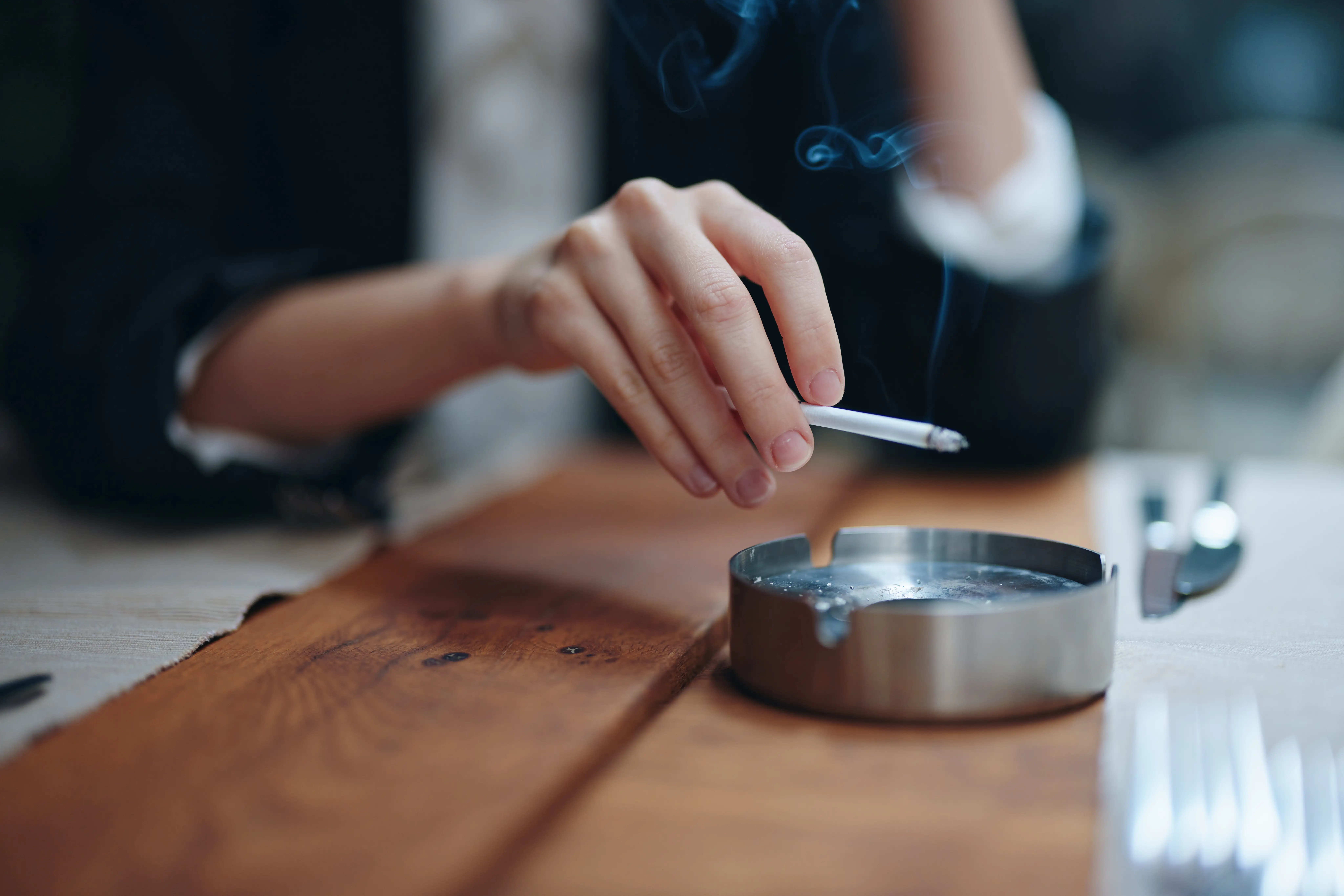Nicotine is a natural chemical found mostly in tobacco plants, and it is the substance that makes products like cigarettes and vapes so addictive.
While it is commonly known for increasing alertness and triggering cravings, its effect on sleep often goes unnoticed. It can be far more disruptive than many expect, and it has consequences not just for rest but for overall physical health.
In this article, we will explain how nicotine affects sleep while you are using it, what happens when you stop, and how to manage the sleep-related side effects. We will also look at how it connects to sleep disorders, what nicotine replacement products can do to your sleep, and practical ways to sleep better through it all.
What is Nicotine?

Nicotine is a stimulant that affects both the brain and the nervous system. It enters the body quickly through smoking, vaping, e-cigarettes, chewing tobacco, or using nicotine patches or gum and reaches the brain within seconds. There, it causes the release of dopamine and other brain chemicals, producing a short-term feeling of focus, relaxation, or pleasure.
However, these effects do not last long. As they fade, the brain begins to crave more, which leads to repeated use and, eventually, addiction. The more frequently nicotine is used, whether through tobacco use or other delivery methods, the more the brain relies on it to feel balanced.
This continued dependence makes it difficult to withdraw or quit and contributes to how strongly nicotine affects both behavior and the body’s internal systems, including sleep.
How Nicotine Affects Sleep

Nicotine has a complicated but harmful impact on sleep. Even if it feels harmless to smoke or vape before bed, nicotine disrupts almost every part of the sleep process. It does not just make it harder to fall asleep; it affects how your body cycles through different sleep stages, throws off your internal clock, and keeps your brain more alert than it should be at night.
Whether you use nicotine regularly or are trying to quit, knowing how it affects your sleep can help you understand why you may be waking up tired and what steps you can take to improve your rest.
Nicotine as a Stimulant
Nicotine is a stimulant, which means it increases activity in both the brain and body by acting on the central nervous system. While many people turn to it for a quick boost in focus, alertness, or even a sense of calm during moments of stress, it can work against you when it is time to sleep.
Instead of allowing the body to relax, nicotine keeps it in a more active, alert state, making it much harder to get deep, restorative rest. Below is a closer look at how nicotine’s stimulating effects interfere with the body’s ability to wind down at night:
- Increased Alertness: Nicotine causes the brain to release chemicals like dopamine and norepinephrine, which boost alertness and focus. That might be useful during the day, but using nicotine in the evening or close to bedtime can interfere with your body’s natural ability to wind down and fall asleep.
- Elevated Heart Rate and Blood Pressure: Nicotine also stimulates the adrenal glands, which raises your heart rate and blood pressure. These changes signal the body to stay awake and alert, making it harder to relax and transition into a restful sleep state. Learn more about What a Normal Sleeping Heart Rate is.
How Nicotine Disrupts Sleep
Nicotine does more than just make it harder to fall asleep; it changes the way your brain moves through each stage of the sleep cycle. It can increase sleep latency, keep you from getting the deep, restorative sleep your body needs, and may wake you up at night, even if you don't recall it.
Over time, this results in poor-quality sleep, leaving you exhausted the next day. Below are some of the main ways nicotine interferes with your sleep structure and quality:
- Reduced REM Sleep: Rapid Eye Movement (REM) sleep is the stage linked to dreaming, memory, and emotional regulation. Nicotine can suppress REM sleep, especially early in the night. This can leave you feeling moody, foggy, or unfocused the next day.
- Difficulty Falling Asleep (Sleep-Onset Insomnia): Nicotine increases brain activity, which can make it harder to wind down at night. Using nicotine close to bedtime often leads to sleep-onset insomnia, where it takes longer to fall asleep.
- Shortened Total Sleep Duration: Because nicotine delays sleep and causes more nighttime wakeups, it often leads to shorter overall sleep. You may not even notice, but your total rest time can be reduced night after night.
- Increased Nighttime Wakefulness: Even after you fall asleep, nicotine’s stimulating effects can make it easier to wake up and harder to fall back asleep. This sleep fragmentation means your rest is constantly interrupted.
- Fragmented Sleep: Nicotine can interfere with your body’s natural sleep patterns, causing you to bounce between light and deep sleep more often. As a result, even after a full night in bed, you may wake up feeling unrested and mentally drained.
Circadian Rhythm Disruption
Your circadian rhythms are your internal 24-hour clock that regulates the sleep-wake cycle and hormone release. It plays an important role in deciding when you feel tired and when you feel alert.
Nicotine also affects your body's temperature control and cortisol levels, which are controlled by your body's internal clock. This can push your bedtime later and later, making it harder to sleep on time. This can lead to chronic sleep deprivation or a condition called delayed sleep phase disorder.
Nicotine and Sleep Disorders

Nicotine use is associated with a range of sleep-related issues, not just occasional disturbances. Its stimulating effects can contribute to insomnia, aggravate conditions like obstructive sleep apnea, and lead to restless or low-quality sleep.
These disruptions can negatively impact both immediate rest and long-term health. Each of the following conditions illustrates how nicotine can interfere with healthy sleep patterns.
Insomnia
Insomnia, difficulty falling or staying asleep, is frequently seen among individuals who use nicotine. Because nicotine acts as a stimulant, it can delay the time it takes to fall asleep and disrupt normal sleep patterns.
This often results in reduced total sleep time, more fragmented sleep, and poorer sleep quality. People who use nicotine generally have lower sleep quality compared to non-users.
When someone stops using nicotine, withdrawal symptoms can make sleep worse. It may involve increased restlessness, vivid dreams, and frequent awakenings. However, these symptoms tend to decrease over time as the body adjusts.
Obstructive Sleep Apnea
Obstructive Sleep Apnea (OSA) is a condition where the airway becomes partially or fully blocked during sleep, causing repeated pauses in breathing. Nicotine use can increase the risk or severity of OSA by promoting inflammation and fluid buildup in the upper airway.
These changes make it more likely for the airway to become obstructed during the night, disrupting normal breathing patterns and overall sleep quality.
Although nicotine may temporarily enhance upper airway muscle tone at the beginning of the night, this effect is short-lived. In the long run, nicotine has a disruptive impact; it interferes with normal breathing patterns and alters the structure of sleep, ultimately leading to poorer sleep quality and reduced sleep efficiency.
Restless Sleep
Nicotine use frequently causes irregular sleep, characterized by frequent awakenings and difficulty attaining deep, restorative rest. Nicotine’s effect on neurotransmitters can heighten nighttime arousals, hindering advancement into deeper sleep phases.
The result is non-restorative sleep, leading to daytime sleepiness and reduced cognitive performance, and it can even impact mental health.
Nicotine withdrawal can additionally worsen restless sleep patterns. Those attempting to quit may experience increased restlessness and difficulty maintaining sleep, particularly in the beginning stages.
The Link Between Nicotine Withdrawal and Tiredness

Feeling unusually tired after quitting nicotine is completely normal, even if you are getting enough sleep. That fatigue is not just in your head.
When you stop using nicotine, it causes real changes in brain chemistry, energy levels, and sleep patterns. While the tiredness won’t last forever, it can be one of the more frustrating symptoms in the early days of quitting.
Why Does Nicotine Withdrawal Cause Fatigue?
One of the most common things people notice after quitting is a deep sense of fatigue. Even with a full night’s sleep, it can feel like your body is running on a low battery.
That is because nicotine doesn’t just affect cravings; it has been playing a major role in how your brain regulates energy, alertness, and rest. Once it is out of your system, your body has to adjust, and that takes time. Here is what is going on:
- Drop in Stimulation: Nicotine is a stimulant. It boosts chemicals in the brain that make you feel awake and alert, like dopamine and norepinephrine. Without nicotine’s stimulation, the body must adjust to functioning on its own, which can feel especially challenging at first. Many people feel physically tired and mentally foggy during the first few days.
- Brain Chemical Imbalance: Nicotine helps regulate dopamine, a chemical tied to motivation, focus, and energy. When you quit, your dopamine levels drop. This drop may lead to low energy, decreased motivation, and emotional alteration. The brain gradually readjusts, but during this period, both energy and mood may be affected.
- Sleep Disruption: Quitting nicotine often messes with your sleep. You might have trouble falling asleep and staying asleep or wake up feeling unrested. Some people deal with restless nights, intense dreams, or waking up more often than usual. Poor sleep often results in reduced daytime energy and alertness.
Common Symptoms of Nicotine Withdrawal
When your body stops getting nicotine, it reacts both physically and mentally. Some of these symptoms can make daily life harder but are temporary.
- Cravings: Cravings for nicotine often appear early and with strong intensity. They are frequently tied to daily habits, emotional situations, or familiar surroundings. While these cravings usually fade within a few minutes, they can feel overwhelming in the moment. Recognizing that these urges are short-lived and preparing effective ways to handle them plays an essential role in staying nicotine-free.
- Mood swings: Giving up nicotine can result in emotional changes, including increased irritability, stronger frustration, and heightened sensitivity. These occur as the brain adjusts to reduced dopamine levels that were previously influenced by nicotine. While these mood shifts can be challenging at first, they generally begin to improve within a few weeks.
- Sleep issues: Nicotine withdrawal often disrupts sleep quality and routine. Quitters may struggle to fall asleep, stay asleep through the night, or feel rested in the morning. In the first one to two weeks of quitting, problems such as restlessness, vivid dreams, and frequent awakening are common.
- Headaches: Headaches are a common symptom during nicotine withdrawal. They are often connected to stress, changes in caffeine intake, or adjustments in blood flow. The severity can differ from person to person, but these headaches usually fade as the body begins to regain its natural balance.
- Difficulty Concentrating: A reduction in nicotine levels can have a temporary effect on mental clarity and concentration. Tasks that are usually simple may become more challenging, and many individuals report experiencing mental cloudiness, often referred to as brain fog. The symptoms improve as the brain gradually adapts to functioning without nicotine.
- Increased Appetite: Nicotine also plays a role in appetite regulation and increases the metabolism of the body slightly. When quitting, one often feels more intense hunger and cravings for food. These cravings often center around sweet or carbohydrate-rich foods, particularly during moments that previously involved nicotine use.
- Nightmares: As the body begins to heal from nicotine use, REM sleep becomes more active. This may result in dreams that are especially vivid or emotionally charged. While these experiences may be intense, they are a normal part of the sleep recovery process and tend to lessen with time.
- Irritability: When nicotine stops affecting dopamine and mood-related chemicals, people typically show a temporary reduction in their ability to handle frustration. Even minor stressors appear to be more overwhelming, and the body produces stronger reactions than normal. Typically, this symptom subsides as the brain restores its chemical equilibrium.
- Anxiety and Depression: Anxiety and depression often affect people in the initial phases of nicotine withdrawal. The sudden drop in dopamine and serotonin levels explains the emotional changes that occur when nicotine withdrawal begins. Most individuals observe a significant enhancement in their emotional well-being after one month when they nurture their bodies with healthy practices and adequate rest.
Nicotine Replacement Therapy and Sleep

Nicotine Replacement Therapy, or NRT, is a common method used to help people quit smoking. It works by delivering measured doses of nicotine without the toxic substances found in cigarettes. While NRT can ease cravings and withdrawal symptoms, it may also influence how well you sleep.
Types and Effects of NRT
Several forms of NRT exist, and each can affect sleep quality in different ways:
- Nicotine Patches: These patches release nicotine gradually through the skin over a set timeframe, usually 16 or 24 hours. While they are effective at keeping cravings in check, some people report sleep problems, such as trouble falling asleep or vivid dreams, especially with the 24-hour version. Adjusting when and how long the patch is worn might help reduce these side effects.
- Gums and Lozenges: With these oral options, users can manage cravings as they happen by chewing gum or letting a lozenge dissolve. While convenient, using them too close to bedtime can make it harder to wind down since nicotine can act as a mild stimulant.
Managing NRT-Induced Sleep Issues
If you are experiencing sleep disturbances while using NRT, consider the following strategies:
- Adjust the Timing: Removing nicotine patches a few hours before going to bed can lessen side effects like insomnia or intense dreaming. For gums and lozenges, try to avoid using them in the evening to give your body time to relax.
- Watch the Dosage: Too much nicotine, especially for those with lower levels of dependence, can make sleep harder to come by. A healthcare provider can help you choose the right dose for your needs.
- Practice Wind-Down Habits: A calming bedtime routine can make a difference. Try light reading, stretching, or meditation to help your body ease into sleep and offset nicotine’s stimulating effects.
- Keep a Consistent Routine: Going to bed and waking up at the same time each day, keeping your bedroom comfortable, and limiting screens before sleep can support better rest while using NRT.
- Talk to a Professional: If sleep issues persist, it is worth speaking with a healthcare provider. They can help adjust your NRT plan, suggest alternatives, or recommend other solutions that support both your sleep and your smoking cessation journey.
Strategies for Improving Sleep While Using or Quitting Nicotine

Whether you are quitting or still smoking, your sleep will be affected. There are steps you can take to help protect your rest and support your body through this transition. The tips below can make it easier to sleep well while your body goes through changes.
- Avoid Nicotine at Least 2–3 Hours Before Bed: Nicotine acts as a stimulant, and its effects can remain for several hours. Using it too close to bedtime may lead to trouble falling asleep, lighter sleep, or frequent nighttime awakenings. If you are not ready to quit completely, simply shifting your last cigarette, vape session, or NRT dose earlier in the evening can still make a noticeable difference.
- Use Nicotine Alternatives Thoughtfully: Gum, lozenges, and pouches can help with cravings, but using them late in the day might still make it harder to sleep. Try to stick to earlier use, and avoid taking them in the evening just out of habit. If using a nicotine patch, you can enhance sleep by changing to a 16-hour patch or taking it off before bedtime.
- Optimize Bedroom Settings: Your sleep setting can strongly influence rest quality. Keep your bedroom cool, quiet, and dark. Blackout curtains, white noise machines, or sleep masks can help block distractions. A comfortable mattress and pillow also play an important role. These adjustments support good sleep hygiene and help signal to your brain that it is time to wind down.
- Establish a Relaxing Pre-Sleep Routine: If nicotine was a part of your wind-down routine, replacing it with something calming can ease the transition. Experiment with activities like reading, light stretching, journaling, or guided breathing. Additionally, avoid screens an hour before bedtime, as blue light can interfere with melatonin and delay sleep further. Learn more about the Bedtime Routine Guide.
- Exercise Regularly: Regular physical activity helps promote better sleep and can also ease withdrawal symptoms such as mood swings or cravings. Exercise reduces stress, promotes deeper sleep, and helps support your body’s natural rhythms. Aim for about 20 to 30 minutes of moderate exercise most days. Just be sure to finish workouts a few hours before bedtime, as exercising too close to bedtime can temporarily increase alertness.
- Cognitive behavioral therapy (CBT): Cognitive-behavioral therapy for insomnia (CBT-I) is a structured treatment for improving sleep. CBT-I helps to identify and reverse habits, stress triggers, or patterns of thinking that may be disrupting sleep. If sleep issues arose or were made worse by nicotine use or withdrawal, CBT can be especially helpful since it has been shown to enhance sleep quality over time. Talking with a certified sleep therapist can offer long-term strategies for regaining good sleep habits.
FAQs
Does nicotine really affect sleep?
Yes, nicotine can affect sleep in several ways. It may reduce deep sleep and REM sleep, make it harder to fall asleep, and cause more wake-ups during the night. As a result, people often feel tired during the day, experience brain fog, or find themselves yawning more than usual.
Why does nicotine make me sleepy occasionally?
After nicotine’s effects fade, it is common to feel a drop in energy. This may be worse if you are also dealing with poor sleep or withdrawal. As a result, you might feel tired during the day and yawn more often than usual.
Do you sleep better without nicotine?
Yes, quitting nicotine can lead to better sleep over time. Many people fall asleep more easily, wake up less during the night, and experience deeper rest. As sleep improves, issues like daytime fatigue, mood changes, and frequent yawning often begin to fade.
Does vaping before bed affect sleep the same as smoking?
Yes, both vaping and smoking deliver nicotine, which can make it harder to fall asleep, reduce REM sleep, and lead to broken or restless sleep. This often results in poor sleep quality, daytime tiredness, and frequent yawning.
How long after quitting smoking does sleep improve?
Sleep may become more difficult during the first few days of nicotine withdrawal. However, most people begin to notice improvement within two to four weeks. As sleep quality improves, it can help reduce cravings, improve mood, and ease fatigue and frequent yawning.
Is nicotine the only ingredient in cigarettes that affects sleep?
No, it is not just nicotine. Chemicals such as carbon monoxide and other toxins in cigarettes can reduce oxygen levels and make breathing more difficult, especially during sleep. This can lead to snoring, poor sleep quality, and increased daytime tiredness.
How long does nicotine keep you awake?
Nicotine stays active in the body for one to three hours, but its effects on sleep can last much longer. It increases alertness and can disrupt the body’s internal clock. Using nicotine in the evening often leads to restlessness at night and tiredness or frequent yawning the next day.
Conclusion
If you use nicotine or are trying to quit, it helps to understand how it affects your sleep. Nicotine makes it harder to relax, messes with deep sleep, and changes REM cycles. It can also throw off your sleep schedule and reduce sleep quality. That means you might feel tired during the day or find it hard to fully rest at night.
Quitting can bring its challenges, like being extra tired, moody, or unable to sleep well for a little while. But there are things you can do that are beneficial. Changing when you use nicotine, improving your sleep environment, or trying CBT can make a significant difference.
Working these problems out can lead to better sleep, less crashing throughout the day, less stress, improved mental health, and a step in the right direction towards being healthier.
Dom Abraham
As the lead content writer at Sleepiverse. Dom pours his heart into writing mattress reviews, bedding product reviews, and medically-reviewed health articles. Dom is from Portugal and likes to spend his free time writing on the beach as it gives him a sense of comfort. Aside from writing mattress reviews in front of the soothing beach view, Dom likes to experiment with new amazing food ideas.


